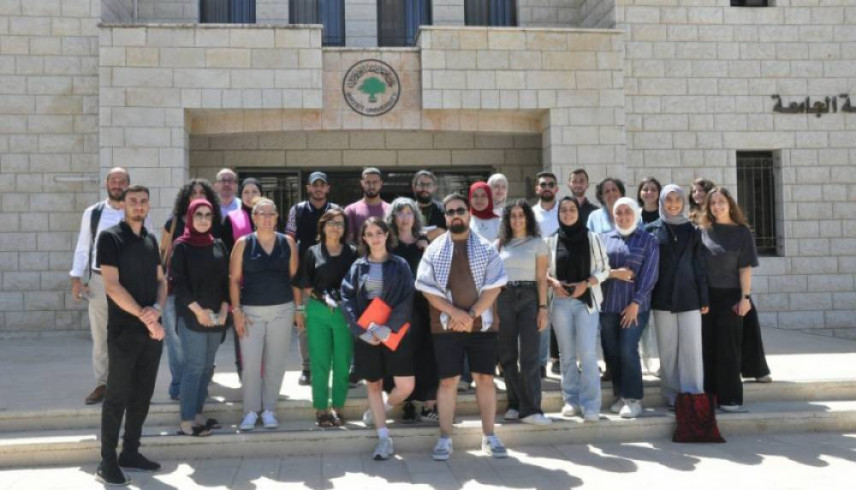
The academic camp for undergraduate students organized by Mada al-Carmel – The Arab Center for Applied Social Studies, in cooperation with the Palestinian Forum for Israeli Studies (MADAR) in Ramallah, concluded on Sunday, September 21, 2025. Thirteen students from universities around the country took part in the camp, which took place over three intensive days that were filled with discussions, tours, and lectures.
The first day began with a visit to the Institute for Palestine Studies in Ramallah, where Dr. Majdi al-Malki, Director of the Institute’s Ramallah office, welcomed the students, along with other staff members. The visit provided an opportunity to explore the rich depth of the Institute’s research resources. Next, Dr. Areen Hawari, the General Director of Mada al-Carmel, and Dr. Honaida Ghanim, the Director of MADAR, presented a dialogue on the experiences of Palestinian students at Israeli universities. The dialogue was moderated by Adan Kinana, a master’s degree student in journalism and media studies at the Hebrew University of Jerusalem. The first day concluded with a lecture by Dr. Himmat Zoubi, a research fellow at Mada al-Carmel, on the foundations of social science research, followed by a discussion moderated by Ali Mousa, Mada al-Carmel’s editorial and production secretary.
 (2).jpg)
The second day started with a tour of Birzeit University. The students were welcomed by Dr. Ala Alazzeh, the university’s vice president, Dr. Basil Farraj, Director of the Abu-Lughod Institute of International Studies, and other university faculty members. The visit gave students an opportunity to have an up-close look at a leading Palestinian university, and to explore its historical and contemporary roles in producing critical knowledge and linking academic research to social and political realities. This was followed by a critical writing workshop with Dr. Himmat Zoubi, and then a lecture on the foundations of ethnography by Dr. Shihab Idris, an anthropologist with a PhD from the University of Haifa. A further lecture was given by Ahmed Mahmoud, a researcher in the modern history of the Middle East at the Jack, Joseph and Morton Mandel School for Advanced Studies in the Humanities, on the subject of archival research. Dr. Areen Hawari moderated this session. The day concluded with a lecture on studying Palestine, delivered via Zoom by Dr. Khaled Anabtawi, a researcher at Mada al-Carmel, and a lecture on studying Israel, by Dr. Walid Habbas, a researcher at MADAR. The session was moderated by Abdelkader Badawi, also a researcher at MADAR.
.jpg)
The third day began with a lecture by Dr. Honaida Ghanim on passion and commitment in social science research, followed by a dialogue session on “Between the Academic and the Political,” with Abdelkader Badawi, Dr. Aysheh Maslamani, a PhD candidate in the Department of Cognition and Brain Sciences at the Hebrew University, and Abdel Hamid Abu Ghosh, a master’s degree student in social work at the Hebrew University. The camp concluded with a tour of the Palestinian Museum in Birzeit, during which the students explored its various departments, as rich sources of visual and archival knowledge. They also viewed the exhibition This Is Not an Exhibition, which brings together paintings from people’s homes in the West Bank, and bears witness to the spirit of Gaza and its artists, who have turned art into an existential act in the face of attempts to strip humans of their humanity.
This year’s academic camp, which was coordinated by Jowana Jbara, a doctoral student in gender studies and coordinator of the Graduate Student Support Program at Mada al-Carmel, provided the participating students with a rich and distinctive experience. It combined knowledge, dialogue, and field visits to create a stimulating environment for critical thinking and openness to new perspectives in social research. The camp was not only a series of lectures, but also a space for shared learning and exchanges of experiences between students and researchers, and gave the participants an opportunity to pose difficult questions and engage in in-depth discussions on current academic and political issues. The meetings with lecturers helped broaden the students’ knowledge base and equipped them with tools and questions to accompany them on their future academic journeys.
.jpg)
.jpg)
.jpg)
.jpg)